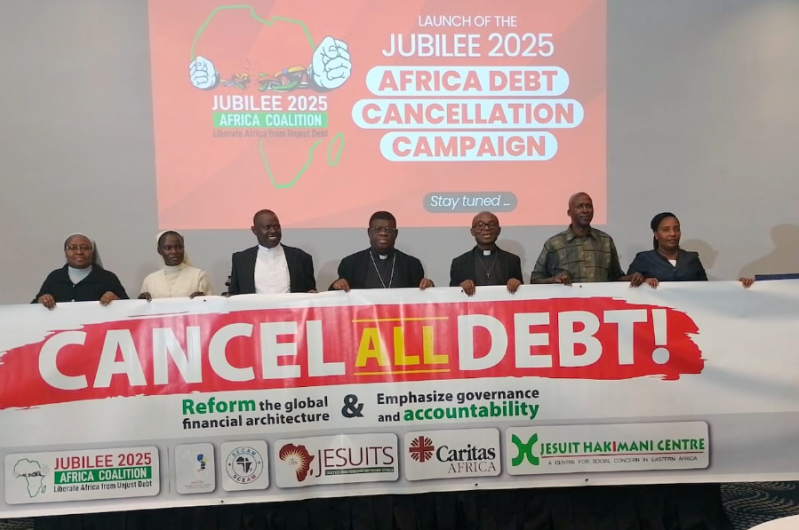
Religious leaders from Africa have intensified their call for cancellation of the continent's crippling private debt and fundamental reforms to the global financial system. In a letter to the UK Foreign Secretary and the Treasury, African Anglican Bishops warned that the unsustainable debt has inflicted "immense suffering" to millions in the continent. Inspired by the Biblical year of Jubilee - where debts are periodically cancelled and the land rested - religious leaders launched the Jubilee 2025 Africa debt cancellation in February with the aim of demanding economic justice and liberation from what some have described as a "new form of slavery."
The campaign is supported by prominent organizations including the Association of Member Episcopal Conferences in Eastern Africa (AMECEA), the Symposium of Episcopal Conferences of Africa and Madagascar (SECAM), Jesuits Justice and Ecology Network in Africa (JENA), Caritas Africa, the All Africa Conference of Churches (AACC), and Jubilee USA Network.
The General Secretary of the Council of Anglican Provinces of Africa (CAPA) Canon Kofi deGraft-Johnson said unsustainable debt has pushed many African nations to a point of crisis. "Money desperately needed in health, education, tackling the effects of climate change and other public services is instead flowing to private companies governed by English law. The Christian faith has much to say about resisting oppression, and I stand with my fellow church leaders from Africa and the UK who call on the UK Government to end this injustice," said deGraft-Johnson in a joint letter to the UK Treasury posted April 23, 2025.
African countries collectively owe over $1.1 trillion in external debt. This financial burden forces nations to make agonizing choices between servicing debts and investing in their people. On average, African countries' combined spending on essential services like health, education, and social protection amounts to only two-thirds of their debt payments, spending $85 billion in debt repayment in 2023, according to a report published by Christian Aid. In 2024 alone, Africa was projected to have spent $90 billion servicing public debt. Many countries are in debt distress or at high risk, with some allocating over 50% of government revenue or domestic tax revenue to debt servicing obligations.
Leaders lament that the crisis has exacerbated poverty, inequality, and governance challenges, plunging communities into hunger and poverty. Bishop Matthew Hassan Kukah of Nigeria noted that while past debt relief freed fiscal space for poverty reduction investments, good governance safeguards are needed to ensure public participation and accountability in the use of funds.
This is not the first time faith communities have mobilized against African debt. Religious leaders recall the successful Jubilee 2000 campaign 25 years ago, which led to the Heavily Indebted Poor Countries/Multilateral Debt Relief Initiative (HIPC/MDRI). That initiative mobilized over $130 billion in debt relief for 38 countries.
While that campaign achieved significant victories, resulting in more than $100 billion in debt relief for some of the world's poorest countries, allowing investments in critical sectors like health and education, leaders feel the promise of resolving the structural debt issue remains unfulfilled. Rev. Dr. Fidon Mwombeki, AACC General Secretary, recalled that some countries that received relief 20 years ago now face even bigger debts.
The current debt crisis is described as more complicated, compounded by recent global shocks such as the COVID-19 pandemic, the ongoing climate crisis, and the Russia-Ukraine war. Since 2010, African countries' interest payments have more than doubled as a percentage of their revenue. The debt burden is seen as a structural issue baked into the current economic system, rather than solely the fault of the debtors.
Bishop Charles Kasonde of Solwezi, Zambia, Chairman of AMECEA, said regarding debt forgiveness: “When debt burdens entrench poverty, amplify inequality and stifle economic growth, we are compelled to act – especially as we approach the Jubilee Year themed ‘Pilgrims of hope’”. He added: “This moment in time challenges us to reshape our financial systems, prioritizing human dignity over corporate profits and the dominance of lender nations”
Fr. Charles Chilufya, Director of JENA, emphasized that debt is not just an economic issue but a moral one that undermines the dignity of millions and stifles development. Some leaders view it as a vehicle for a new struggle for Africa, where sovereignty is threatened, and vital resources are given away.
In response, African religious leaders are calling on global decision-makers, including the G20, G7, United Nations, IMF, World Bank, and specifically the UK Government, to take action.
The Jubilee 2025 Africa Debt Cancellation Campaign goes beyond unjust debt cancellation and re-calibration of the global financial system to implementing responsible lending and borrowing principles, identification of additional sources of finance that do not create debt and including debt contract clauses that share climate and other risks between creditors and debtors.
The campaign also aims to compel private lenders to participate fully in debt relief initiatives, push for enactment of legislative reforms that govern financial centres and govern debt contracts, and strengthen financial transparency and accountability in the use of public funds.
Bishop Kasonde stated that the campaign's vision is to see Africa liberated and thriving within a fair global financial system, strengthened by ethical leadership and robust governance. While acknowledging that achieving this vision requires persistent effort and global cooperation, the religious leaders remain hopeful for a future unburdened by crippling debt.






